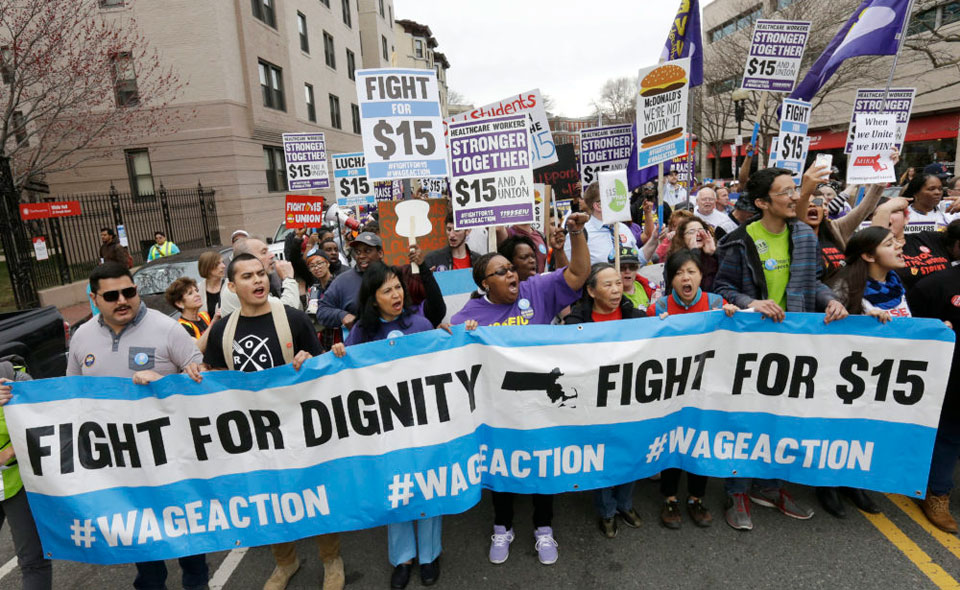
WASHINGTON—Joined by a top “Fight for $15 and a union” campaigner, congressional Democrats formally introduced legislation to raise the federal minimum wage to $15 an hour by 2025. That would more than double the current minimum for adult workers, $7.25.
The wage hike would particularly benefit women, who are 60% of all minimum wage workers, as well as Black and Latino workers, a fact sheet on the Raise The Wage Act says.
Fran Marion, a McDonald’s worker from Kansas City, Mo., and a Fight for 15 national leader made the same point in human, not legislative, terms.
“Fifteen dollars will be life-changing,” the single mother of two teenage boys told a Jan. 26 Zoom press conference unveiling the legislation.
“It’ll help us keep a roof over our heads, food on the table, have health care and I’ll be able to save to send my teenagers,” Raymond and Rashid, “to college.” Marion now makes substantially less than $15.
“Many of us, especially Black and brown workers, have been left behind,” she added.
The increase is also a key plank in President Joe Biden’s “Build Back Better” agenda to pull the country out of both the coronavirus pandemic and the economic depression it caused. He included the $15 minimum wage in his $1.9 trillion pandemic economic aid plan.
But congressional Republicans already oppose the hike for the nation’s lowest-paid workers, as do their puppeteers, the corporate class. So when the Democratic-run House OKd the $15 minimum wage in the last Congress, then-Senate Majority Leader Mitch McConnell, R-Ky., refused to even allow hearings.
This time, the Republicans may force Biden to drop the minimum wage hike to get the rest of his economic aid measure—including extended jobless benefits, more money to get anti-viral vaccines into people’s arms, and aid to state and local governments and schools—approved.
If so, said new Senate Budget Committee Chairman Bernie Sanders, Ind-Vt, he’ll use a budget “reconciliation” bill, which the GOP can’t filibuster and which needs only 51 votes, not 60, to pass, to raise the minimum wage. But Sanders expects fewer than 10 GOP senators will go along, those that realize their own people are hurting.
And House Education and Labor Committee Chairman Bobby Scott, D-Va., said that since his panel approved the hike to $15 in the last Congress, he may try to bypass hearings and bring the measure straight to the full House for an up-or-down vote this spring.
Voters, even in red states, like raising the minimum wage, a point the congressional GOP doesn’t get. Florida led several states last November in raising its minimum wage, by a voter referendum, after the GOP governor and GOP-gerrymandered legislature didn’t. The hike won, 61%-39%.
“This is not a radical idea. This is what Americans want. Voters in state after state understand we have to end starvation wages in America,” Sanders added.
Some 32 million will benefit
The Republicans’ state and federal refusal to raise workers’ pay makes the federal stand-alone minimum wage increase legislation even more important. An Economic Policy Institute analysis shows 32 million workers, or around 22%, would directly benefit by each seeing $3,300 more in their pockets by 2025.
“After more than a decade with no increase in the federal minimum wage–the longest period in U.S. history–there is now no place in America where a full-time worker making the federal minimum wage can afford rent, food, and other essentials,” the fact sheet says.
“As a result, millions of our nation’s workers–including many of our celebrated essential workers–are working full-time jobs but are still struggling to make ends meet. One in nine (their emphasis) U.S. workers is paid wages that leave them in poverty, even when working full time and year-round.”
“Raising the federal minimum wage is a powerful tool to address racial pay inequality,” the fact sheet adds. “Nearly one-third of all Black workers and one-quarter of Latinos would get a raise. Women comprise nearly 60% of workers who would see their pay increase.”
Besides the minimum wage hikes of $2.25 this year, $1.50 in each of the next three years, and $1 in 2025, the legislation would also follow the final increase with indexing the minimum wage to inflation. In 1968, the minimum wage was approximately half of the median worker’s hourly wage.
Afterwards, GOP presidents and congresses raised it infrequently. Now the minimum is far below half the median. Indexing would halt further deterioration. The median is the point where half of the workers are above a wage figure and half are below.
The measure would also eliminate the tipped minimum wage, now $2.13 an hour. That hasn’t increased since the Reagan administration, while the regular minimum last rose in 2009. The tipped minimum wage would more than double in 2022, to $4.95, then rise to $12.95 hourly in 2025 and the regular, indexed, minimum after that.
Ditto for the youth subminimum wage, now $4.25 an hour, which would increase to $13 in 2025 and then the regular minimum, and for the extreme subminimum for workers with disabilities. It would be $5 an hour in 2021 and $15 in 2025.
The tipped minimum is supposed to go to millions of workers, such as taxi drivers, restaurant servers, and baggage porters, who survive on tips. If their tips don’t net them the current federal $7.25 minimum, bosses are supposed to make up the difference. In practice, many bosses don’t, and those low-paid workers lose millions of dollars yearly in wage theft. The GOP Trump regime’s Labor Department recently issued rules that would shove more workers onto the tipped minimum more of the time.
Eliminating the tipped minimum, in favor of one minimum wage for all adult workers, would not only give those low-paid workers a raise by 2025 but would curb if not end the wage theft, too, analysts say.
Passing the Raise The Wage Act also will ensure “fewer Americans will have to rely on government support” to exit from the wage depression due to the coronavirus pandemic, Rep. Stephanie Murphy, D-Fla. “Too many working families are struggling to make ends meet,” the Vietnamese-born lawmaker added.“$7.25 isn’t a living wage in Orlando, Fla.” Nor anywhere else, Scott added: “A family earning $7.25 an hour cannot afford a two-bedroom apartment in any county in the country,” he noted.










